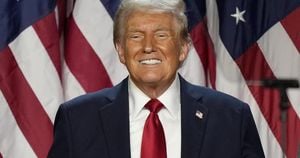South Africa’s economy is currently under intense scrutiny as inflation data and currency rates reveal significant insights about its health. Despite various global pressures and local challenges, the South African rand has surprisingly held steady against the U.S. dollar. This resilience was showcased on Wednesday when the rand traded at R18.20, responding to recent fluctuations within the dollar, which weakens under the weight of newly released U.S. inflation figures.
On the U.S. front, the dollar index dipped by 0.7% after the personal consumption expenditures price index, which reflects consumer spending, rose marginally by 0.2% last month. This increase matched the previous September’s rise, indicating no notable acceleration of inflation, which had been a major concern for global markets. Investors, particularly those focusing on South African economic indicators, are closely monitoring these developments.
South African traders are not just watching the foreign exchange markets; they are also tuned in to domestic economic reports. Key data expected soon include the monthly producer inflation set to be released on Thursday and findings related to money supply, trade, and budget balances due on Friday. These reports will provide more clarity on the state of the local economy amid rising global inflationary pressures and trade uncertainties.
Meanwhile, the sentiment on the Johannesburg Stock Exchange reflects some caution. For example, the Top-40 index noted a slight drop of 0.4%. Conversely, South Africa’s 2030 government bonds showed encouraging signs as their yields decreased by 2.5 basis points, landing at 9.03%. This juxtaposition between stock market performance and bond yields points to investor sentiment grappling with uncertainty.
While the financial markets digest this latest information, another story has captured the public’s attention—a substantial lottery win. On the same day as the rand's performance was unveiled, news broke of a South African man claiming his R77 million Powerball jackpot just hours after discovering his win through his bank. This victory, amounting to R77,428,794.30, highlights not only individual luck but also the role of technology in the lottery industry.
The lucky winner, who had spent R90 selecting his numbers through his banking app, expressed immense joy and relief, declaring it would drastically change his life. His plans involve launching the business he’s long dreamed of and settling on his home loan, showcasing responsible financial planning. He stated, “I am so happy and relieved about this win – it’s going to change my life forever.”
Ithuba, the operator of the National Lottery, confirmed the winner’s ticket for the November 26 draw was purchased digitally—a clear nod to the growing trend of online lottery participation, which has gained traction especially during the pandemic. Ithuba’s CEO, Charmaine Mabuza, remarked on the significance of facilitating secure and convenient ways for citizens to engage with the lottery.
Transitioning from economic concerns to local sentiments, the broader atmosphere reflects both hopes and anxieties. Amidst fluctuated currency values and consumer price pressures, South African citizens cling to their stories of good fortune amid economic uncertainty. These narratives inject optimism and highlight the importance of fiscal responsibility and planning.
Looking beyond individual fortune, the political scene is also seeing major activity. Recent developments include the South African government welcoming ceasefire agreements between Lebanon and Israel, signaling its diplomatic ambitions and commitment to international peace-building. This approach, noted by various commentators, mirrors the administration’s inherited legacy as it navigates the complex waters of foreign relations.
Another focus of political discourse is the persistent energy crisis. Load shedding continues to affect daily life, severely hampering growth prospects and daily operations for businesses and households alike. Various policy responses are being examined as leaders grapple with mounting pressure to find sustainable solutions to energy management.
These domestic initiatives come at a time when South Africa is urged to rethink its economic partnerships. Recent discussions between French President Emmanuel Macron and Nigerian counterpart Bola Ahmed Tinubu have cast light on new avenues for economic cooperation across Africa. Such dialogues are pivotal for fostering trade relations, addressing common challenges, and enhancing synergies among African nations. South Africa's leaders are likely seeking to solidify their country's role as both a regional leader and pivotal player on the continent.
The streets of South Africa echo with mixed sentiments, combining the joy of individual success with the broader economic and political challenges. The stark reality remains: as citizens celebrate individual wins, they also endure the fluctuations of the economy and the vigilance required to navigate uncertainty.
Despite being midstream, South Africa’s 2025 census is another key indicator of the nation’s demographics and the shifting economic landscapes. Scheduled for 2025, this event will supply important statistical insights, helping to guide future economic planning and government funding allocations. It forms part of the broader strategy aimed at streamlining governance and addressing the pressing needs of various sectors.
If there’s one thing clear from both the economic stance and personal stories, it’s the resilience of South Africans. Whether faced with the highs of winning considerable prizes or the lows of economic instability, the people adapt, seeking light even during challenging times. The interplay of these elements—the rand's steadiness, the life-changing lottery win, and the political recalibrations—illustrates the complex yet vibrant narrative of South Africa today.
With upcoming financial reports shedding light on domestic economic conditions and continued scrutiny of political developments, South Africans remain vigilant, ready for the next chapter of their intertwined economic and political saga.



